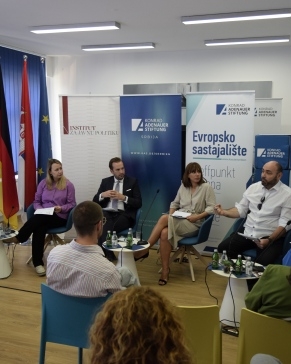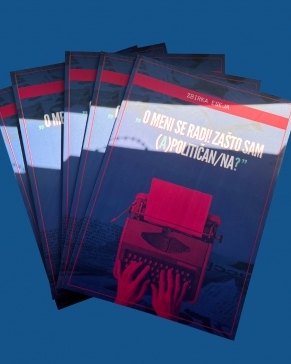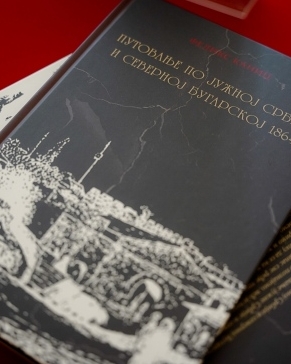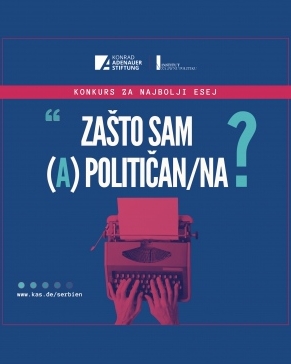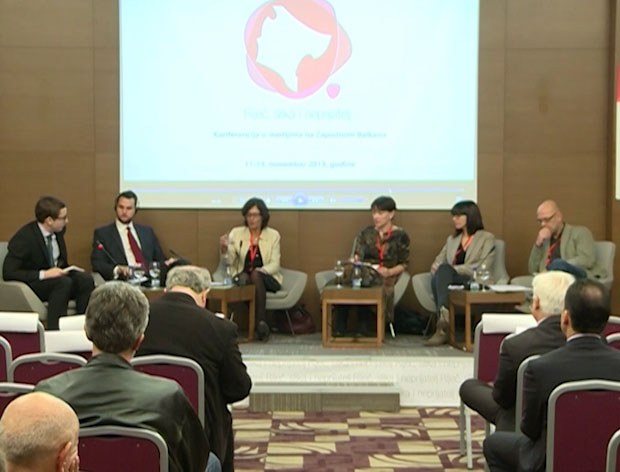
The Conference Word, image and enemy was organized in Podgorica from 11th to 13th November 2013, with the primary goal to launch a public debate on the role of media in the process of securitization. Although a new term in Western Balkans, securitization is a highly relevant theoretical concept, especially for the analysis of the role of media, since one of its main copmponents is related to the public image.
The Conference brought together media experts and journalists from all over region and the European Union, opening up and bringing to light, for the first time in Montenegro, topics which have not been in the main focus of popular events for the media in the region in the past decade. This gathering initiated a debate on issues that gravely condition the freedom of the media, in a highly professional and argumentative way, by actualizing issues of political instrumentalization in media, violation of human rights, ethics and standards of journalism and in particular, the role of media in the process of securitization, as a phenomenon that leaves a profound negative effect on the lives of individuals, society and the state. The aim of the organizers was fully accomplished.
According to Copenhagen school of security studies, “securitization is an extreme version of politicization that enables the use of extraordinary means in the name of security”. Therefore, the problem (situation, person, event, a process) becomes ''securitized'' or treated as security issue, through a speech- act (or image). In other words, when a situation is presented as a “threat to security”, all the methods of solving it become legitimate, since the problem represents a threat to society, people, and overall security. After analyzing a vast number of articles, front pages, images and headlines, the project team concluded that media can at the same time be the tools in the hands of political and business circles, but also actors who put the problem, issue or an event (or a person) on social agenda.
Content-wise, the conference Word, image and enemy, was consisted of 4 panels, and of topics that thoroughly explain the negative role of media in the process of securitization, as well as in the variety of political and social processes; two publications of investigative journalism; EX-YU Forum of Western Balkans journalists, and a multimedia exhibition, which presented a striking illustration of the actual content of the panels, forums and discussions.
The Conference was opened on 11th November 2013 by the President of the Executive Board Ranko Vujovic, Minister for Human and Minority Rights in the Government of Montenegro Suad Numanovic, Minister of Culture of Montenegro Branislav Micunovic, Head of the Delegation of the European Union to Montenegro Mitja Drobnic andSpecial Advisor to the UN Secretary-General Ban Ki-moon for reaching Millennium Development Goals Philippe Douste Blazy. In the opening panel of the Conference, the speakers stressed that the responsibility of the media is crucial for the further democratization of society, and that Montenegro has an important and responsible task to show maturity in the way of establishing the rule of law, respect for ethical principles, acceptance of differences, both in all areas of public and social life, as well as in the media segment.
In the first panel, entitled Power of media in the new millennium, the audience was addressed by Alessio Vinci via video link, Efrem Radev from the Regional Cooperation Council, Andrzej Krajevski in front of the self-regulatory body of Poland, Antun Vujic as a former Minister of Culture in Croatia, Stevan Lilic, the President of the Executive Board of the Public Policy Institute and Zoran Pazin, representative of of Montenegro before the European Court of Human rights in Strasbourg. The panel was moderated by Vanja Vardjan, a journalist from Radio-Television Slovenia.
The central message of the panel was that the media play an important role in the society in raising issues on the social agenda, but it is of utmost significance that media activity in this process is within the system of rule of law and respect for professional standards.
The Conference was continued with the presentation of the book Sto faca i Aca, written by a journalist and TV host of the Croatian Radio Television Aleksandar Stankovic, with Gordana Borovic, a journalist, as a speaker as well. This was followed by the presentation of the book Anatomija jedne hajke, written by a journalist and publicist Semsudin Seki Radoncic. The speakers on the panel were also a journalist Darko Sukovic, the president of the Association of Bosnia and Herzegovina's refugees deported from Montenegro in 1992 Jasenka Perovic and a journalist and publicist Andrej Nikolaidis. The panel was moderated by Selena Tasic, a journalist.
On the second day of the Conference, the audience was addressed by Lene Hansen, from the University of Copenhagen, via video link, who spoke about the phenomenon of the role of media in the process of securitization, citing a number of interesting case studies.
The panel Issue marked as high-risk was comprised of participants like Florence Hartmann, ex spokesperson of International Criminal Tribunal for former Yugoslavia, Nidzara Ahmetasevic from the University of Graz, with the subject Trial for war crimes in the media on the territory of the former Yugoslavia. Securitization of the Crisis in Greece in the global media was depicted by George Tzogopoulos from Eliamep Institute from Athens, and securitization of the Pride Parade in the Serbian media was presented by Mina Pejic from the Faculty of Philosophy in Belgrade. Bernard Nezmah, a docent on the Faculty of Philosophy in Ljubljana and columnist of Mladina spoke about securitization of Euro-Atlantic integration in the Slovenian media. Moderator of the panel was a professor at the Faculty of Political Sciences in Belgrade Filip Ejdus.
The attention of those present was raised by the intriguing topic of the second panel, State as a state enemy. Velimir Curgus Kazimir, from the media archive EBART, spoke about the media securitization of Montenegro in Serbian media, while Nikola Tomic, the assistant Editor-In-Chief of the Danas, elaborated the theme The Role of media in the assassination of Serbian Prime Minister Zoran Djindjic. Securitization of state in the state was a theme presented by Srdjan Kusovac, a journalist and current adviser to the Prime Minister of Montenegro to the media. Mirjana Kusmuk, a journalist from Nezavisne novine, spoke of tabloid journalism directed against political opponents in Bosnia and Herzegovina. One of the panel participants was also the writer Svetislav Basara. A special interest was raised in the telling of journalist Brankica Stankovic, which was related to coping with the problems of direct threat to her own life through the implementation of the inestigative journalism show The Insider.
Together with Ms Stankovic, we had the chance to hear the interesting stories of her collegues Jasmina Pasic, Mirjana Jevtovic and Miodrag Cvorovic. This panel was moderated by the Editor-In-Chief of Montenegrin PRVA Television, Sonja Drobac.
Journalists from Montenegro, Serbia, Croatia, Bosnia and Herzegovina, Kosovo and Macedonia spoke of new media and ethical standards, with special emphasis on internet and regulation, within EX-YU forum. The speakers were Jaksa Scekic (Reuters Serbia), Bosko Jaksic (Politika), Petar Lukovic (E-novine), Ivan Cvejic (BETA), Goran Milic (Al Jazeera), Borjan Jovanovski (Macedonia), Vanja Vardjan (RTV Slovenia), Adriatik Kelmendi (TV Kosovo), Slavko Mandic (Skala radio), Radojka Rutovic (TV Montenegro), Dario Novalic (Bosnian magazine START), Nikola Martinovic (lawyer), Nikola Vujanovic (Montenegro), Amer Ramusovic (Montenegro), Budimir Damjanovic (Montenegro), Milan Mica Jovanovic (Serbia), Kristina Vujic (YUCOM Serbia), Selena Tasic (Foreign Policy Institute Montenegro-Serbia). The moderator of the EX-YU forum was the General Director of the Directorate for Media, of the Ministry of Culture, Zeljko Rutovic.
The quality and the quantity of power that media have over human lives was a topic portrayed in an effective manner within the third panel by Vesna Malisic, Editor of NIN, who elaborated the subject of The power of media over the lives of individuals and Aleksandar Stankovic with the topicThe value of human life in the Croatian media. Benjamin Perks, the UN expert on human rights and the director of UNICEF in Montenegro spoke about human rights violations in the media. Participants had the opportunity to hear more about violations of ethical standards of reporting in media in Bosnia and Herzegovina from the editor of the daily Vest from Macedonia, Borjan Jovanovski, as well as examples of the same in Bosnia and Herzegovina by the former ombudsman for media Mehmed Halilovic. Moderator of the panel that sparked a lively debate among the audience was the editor of the portal Analitika in Montenegro, Drasko Djuranovic.
The main event of the Conference was a multimedia exhibition Word, image and enemy, whose purpose was showing to the public more than 1,000 copies of the negative media coverage in the Western Balkans, as well as around the world, as an example of a direct violation of all the ethical standards and norms of journalism. The exhibition was opened at the gallery Art Pavilion by a journalist and editor of the exhibition Branko Vojicic and a prominent Montenegrin journalist Danilo Burzan.
The exhibition will be open for public until 27th November in Podgorica, and afterwards it will be presented in other towns in Montenegro, with the main goal to visually depict to the visitors the role of the media in the process of securitization of topics, subjects and events; to present examples of political instrumentalization of the media, highlighting the pieces that represent a vicious violation of human and minority rights in media reporting, and finally, to try to draw the attention to the immeasurable importance of professionalism in journalism. More than 1,000 examples of front pages from around the world and the region, with the analyzed elements of photogaphs and headlines, are indicators to the public of the manipulative power of media in the processes of creating, managing and reasoning reality. All this while completely losing the norms of professional journalism from focus, forgetting that the main aim of journalism is public interest for correct and accurate information.
The Conference was covered by numerious regional media, with more than 400 articles and reports about it, as well as numerous columns, reviews, interviews, etc. This event produced diverse reactions, a high quality debate and made representatives of the profession throughout the Balkans, engage in an active and more comprehensive approach to the important issues that were the subject of discussion. The goal of the organizers was fully accomplished. This event did not have as its intention the gathering think-alike individuals, who would leave Podgorica with no clear messages and recommenations for future work, on the contrary, the intention was to initiate activities aimed at self-critical and dialogue-based perception and analysis of the media scene in the Western Balkans.
The Conference was also marked by an unprofessional, politically instrumentalized and carefully planned action by several media in Montenegro. A typical scenario of tabloidized Balkan media scene, seen so many times before, marked this event as well. Discreditation and securitization of the organizers, participants and guests of the conference, offensive headlines, caricatures, photo-edits, hate speech, distortion of facts etc. were once again an attempt to repress every different opinion in transitional society in the Balkans. A group of certain media, NGOs and representatives of international bodies, bonded by common financial interests, once again demonstrated that until Western Balkan societies accept that the plurality of opinions and attitudes are main postulates of democracy, transition from the post-conflict and and developing socio-political context to a developed democracy - will not be possible.
The Conference Word, image and enemy was organized by the Media Self-Regulation Council of Montenegro, Association of independent electronic media of Montenegro, Association of commercial electronic media of Montenegro, Association of Montenegrin journalist, Association of local print media and Public Policy Institute; supported by the Ministry of Culture, Ministry of Human and Minority Rights of Montenegro, as well as a number of donors and sponsors.
SUMMARY
The Conference Word, image and enemy managed to launch, in a highly qualified and professional way, a vigorous public debate on the situation in media, not only in the Western Balkans, but beyond. The public had the opportunity to hear and see many examples which explain in detail the role of media in securitization of issues and events, and how these activities affect many processes in society, and what kind of lasting effects can be produced by an unprofessional and politically instrumentalized media reporting, both in the transition states, as well as in established democracies.
To summarize, the participants of the Conference are clear in the conclusion that the phenomenon of securitization and all its manifestations, are predominantly reflected in the collapse of the value system as well as ethical and cultural dimension of public interest and the right on information as a public good.
Respect for the rights of the Other and the right to privacy of the individual, was abolished by the self-proclaimed right of media capital to sell securitized, manipulative and fabricated so-called information, shaping the public opinion to their own interest, in order to become the dominant and politically influential factor in society, without any legal or political accountability.
Phenomenological- business model of media securitization at all costs, contrary to the public interest, will leave a deep impact on the democratic, political, cultural and media life of society.
All public entities of the society have an equal obligation to actualize the manipulative phenomenon of securitization, question the content of it and prevent it through education, in order to establish and sustain the democratic tools and civilization progress, which is all based on justifiable power of dialogue, contrary to the power of concentrated media money.

